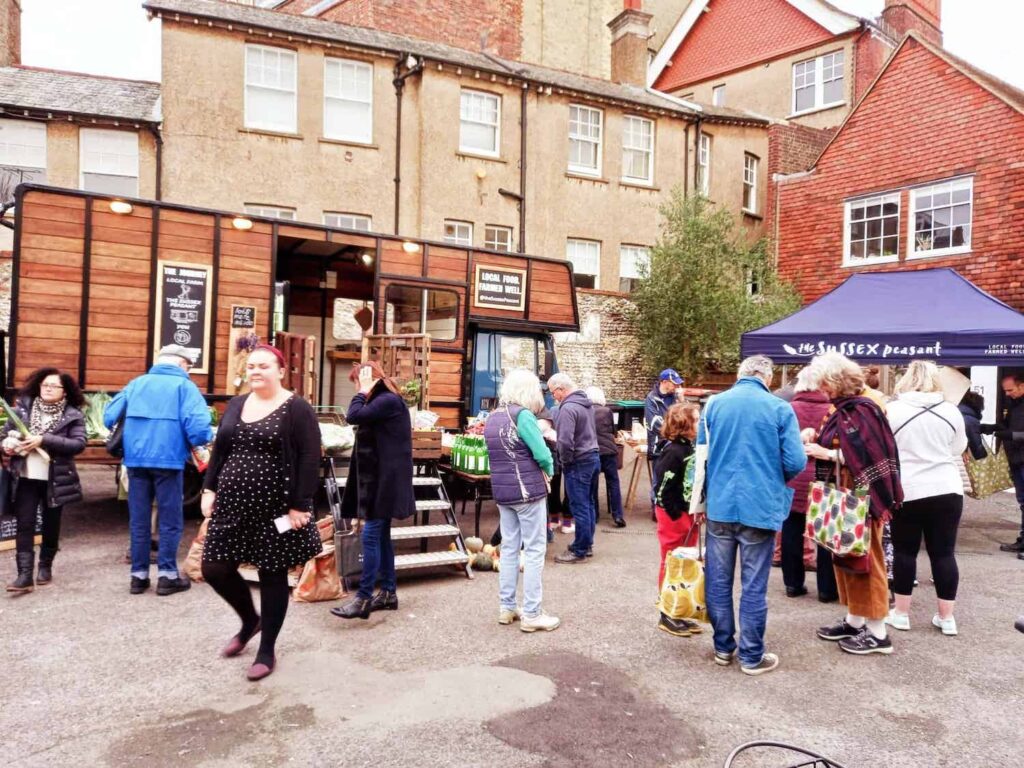Community header template
- Home
arrow_drop_down
- News
arrow_drop_down
- What’s On
- Local Information
arrow_drop_down
- Community Groups
arrow_drop_down
- Business Support
arrow_drop_down
- Advertising Rates
- Business Networks
- Akin Arundel
- Arundel Chamber of Commerce
- Consultants, Admin Support & Office Space
- Film Location & Production Support
- IT & Technical Support
- Legal, Financial Planning, Accountants And Insurance
- Local Publications And Media
- Marketing, Printing & Digital
- Business Newsletter
- Local Directory
arrow_drop_down
- Estate & Lettings Agents & Architects
- Health, Beauty & Wellbeing
- Home & Gardening Services
- Legal, Financial Planning, Accountants And Insurance
- Photographers, Fashion & Lifestyle
- Retirement, Care & Funeral Services
- Travel, Holidays & Languages
- Tradesman, Builders and Property Services
- Vehicle Repairs, Storage, Hire & Taxi Services
- Weddings, Events & Entertainment
- Contact
Can Real Food Reign Sovereign Again?

Published Spring 2022, by Deborah O’Reilly
Burpham resident Deborah O’Reilly is an ex-corporate responsibility adviser, an animal lover and eco-activist. Here she examines some of the issues around our ability to obtain ‘real food’ not sourced via multi-national corporations.
SEEING scant or empty shelves at Arundel’s local Co-operative store these days, brings home our vulnerability to food imports. The UK only produces about 20% of the fruit it consumes and 56 % of vegetables. This not an intelligent position to be in. After a long honeymoon, the dominance of the supermarkets and the global, cheap- food culture (eight companies control eighty percent of our food supply) now looks more like an unhappy marriage of over-exploited farmers, animals & land and long, vulnerable supply chains. Add to that the legally sanctified absurdities of international trade, where equivalent produce or even live animals are imported and exported by the same countries, sometimes from the other end of the globe, often, to low standards.
The problems created by industrial agriculture are complex and global. It’s hard to conclude if Big-Ag’s formula works for anyone except multinational companies. What sort of dubious techniques and chemicals must be used to keep such highly-travelled foods “fresh” after days or weeks? What sort of callous food culture transports sentient beings to their deaths, in terrible conditions for days or weeks? Does being so dependent on food that is so hard on animals, the environment and our gut biomes really make any sense? What does it say about us that we accept this machine- like, corporate food landscape?
Bring The Stolen Harvest Back Home
If we are keen to “reclaim the stolen harvest” as Indian food campaigner Vandana Shiva describes it, doesn’t buying more local food seem like part of the answer? And not just from a food security viewpoint. There are numerous studies advocating wide- ranging benefits of local food systems, including, less air miles, higher freshness and nutrient content, better custodianship of the land and animals, more biodiversity and a closer connection between consumers and where their food comes from. There is helping of enlightened economics that goes with it too. The New Economics Foundation has calculated that £10 spent in a local food business is worth almost £25 to the local economy. This is what the idea of food sovereignty is about – returning control of what is grown and how to growers and communities.
Any visit to a Farmers Market is a lively demonstration that people are interested in food. But these markets occur usually just once a month. How can citizens get access to good, ethical local food more regularly? Who from and how do we find out about them? It’s not so easy. A look at the on-line local food producer map Big Barn (discovered as a well-hidden link on the National Park’s website) shows just a few, some of them very specialised, some very well-known like Pallants.
For something a bit different, step in innovative local food business models like The Sussex Peasant (SP). This thriving and passionate enterprise is based around a collective of fifteen Sussex small farmers. Eighty percent of their produce is organic and SP acts as an ethical distributor and marketer for them, taking the risk of guaranteeing farmers the sales, collecting the produce and selling it from various mobile farm shops on weekly pitches secured in towns around West Sussex, including in Arundel, every Saturday. The Sussex Peasant is very deliberately a custodian of certain values and practices – low or no chemicals, biodiversity enhancement, high animal welfare. After four years, they now have five mobile farm shops, waste is minimal and anything unsold is given to local food banks or if meat, it is frozen. Another key aspect of their approach is the traceability of the farms from whom they source – all are lovingly described on their website – the one closest to Arundel is Nutbourne Nursery near Pulborough, noted for their many different & flavourful tomato varieties, grown pesticide free.
In this age of homogenous anonymity, isn’t it more interesting and comforting to know where our food comes from and that it didn’t originate hundreds or thousands of miles away?
Core to Sussex Peasant’s philosophy is that good food, well farmed creates a type of “social glue”. Ed Johnstone, co-founder stated “We want to restore a local food network, the land the produce grows on and its farmers, into pivotal roles within their community. With greater respect for the land and farmers, careers in agriculture and land stewardship could once again be seen by young people as a desirable and worthwhile pursuit”.

If we really want to give ourselves greater control over the availability and quality of what we eat and even to rebuild our relationship with food, it seems we need many more small businesses and networks like these. What can be done to support their emergence and success?
The Farmworkers Alliance, Sustain and RSPB are lobbying government to establish a Local Food Infrastructure Fund, which would enable new and upcoming farmers to access the funds, land, equipment, know-how and marketing support that is needed to create viable local and regional food webs.
In the meantime, how could we be part of this? Ed from Sussex Peasant would like us to think more about where our food comes from, prioritise what is locally- grown and eat seasonally. As well as shopping more from independents, why not let your MP know that you would like to see real government support for smaller scale, local growing and distribution projects? For those who can afford it, perhaps become an investor in social enterprises that aim to secure cultivable land for local food production and new –entrant farmers, before it is forever priced out of the market for anything other than housing development? The Ecological Land Co-operative and the Vegan Land Movement are two innovative models trying to do just that. A step further in engagement would be to take a whole town approach to using all available, useful space to grow vegetables and fruit for everyone. Started in Todmorden, Yorkshire, Incredible Edibles has now become a growing and educational network of towns aiming to “create kind, confident and connected communities through the power of food”. Perhaps Arundel could join this network?
In the famous and wise words of Vandana Shiva- “The time has come to reclaim the stolen harvest and celebrate the growing and giving of good food as the highest gift and the most revolutionary act”.
